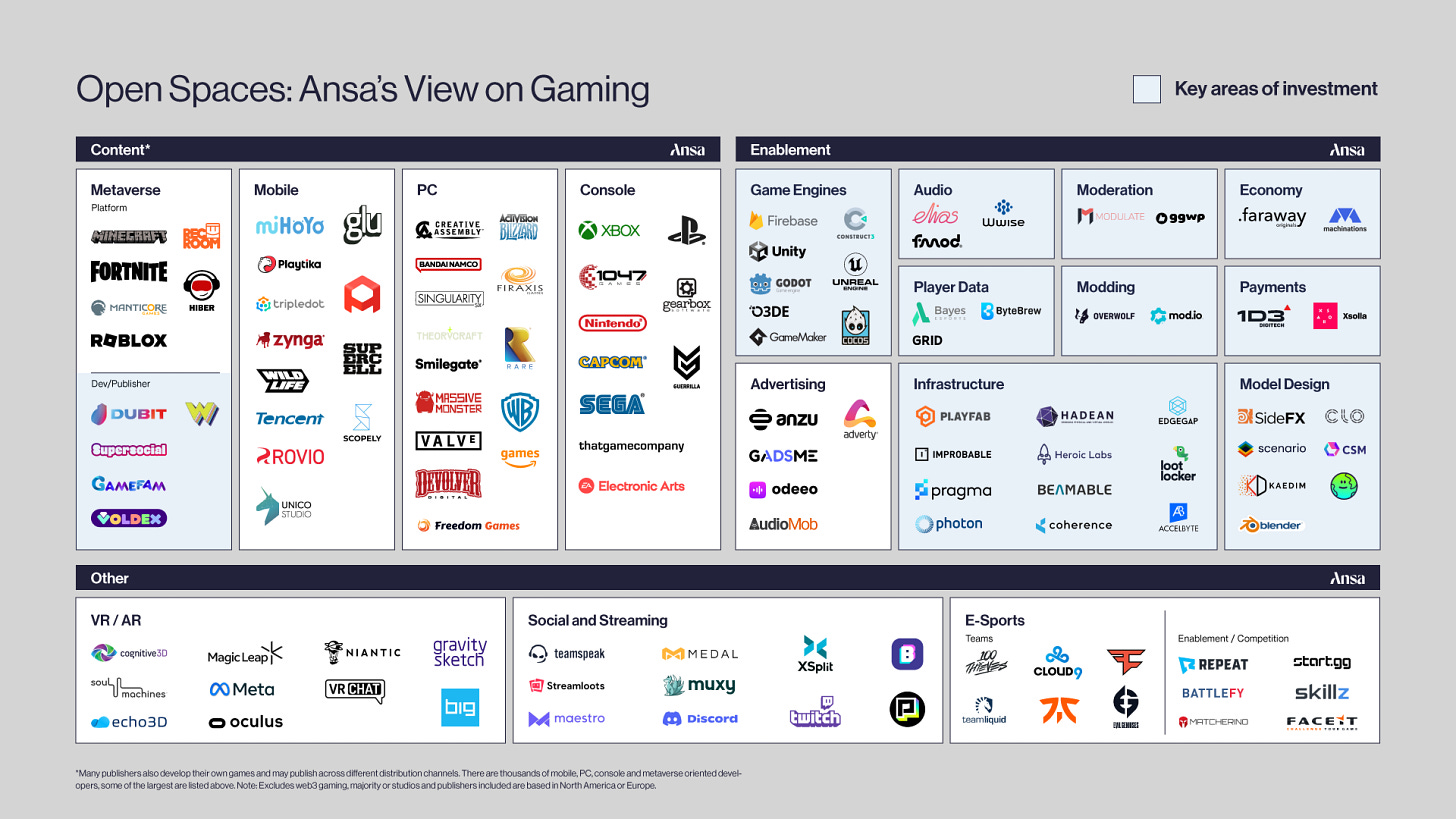So, the last time we wrote about gaming, Duncan was deep in Baldur’s Gate. Weeks later, after we pulled him out and got him some sleep, it felt like time to share our market map on the space. Building upon our team's recent Open Spaces [our signature series of white paper-style articles exploring our thesis areas], we're introducing our Gaming Market Map - which highlights our partnership’s views on the gaming industry's rapidly changing face, spanning content, enablement, social, streaming, and much more.
The top 3 questions we get from gaming CEOs we meet when considering an investment are:
What is our in-house POV on the gaming universe?
Where are we actively investing in the category?
Why should an entrepreneur in this space work with Ansa?
This post touches on each, and we hope it shows we’re not just observing the ecosystem - we’re behind the scenes in partnership with founders helping to define it.
Introducing our Gaming Market Map:
As we’ve started to invest in the gaming renaissance, we distilled this landscape into a couple of pivotal areas we’re focused on.
Content
Content is the lifeblood of gaming, which is why we invest in this space. When we back a business in this space, we go beyond supporting their in-house development infrastructure. We also help them draw game content from three other channels – Hollywood IP licensing, third-party publishing, and M&A. Similarly, we know ourselves well enough to know who we’re not for – we don’t back AAA studios pre-launch, for example, and have no interest in competing with Xbox for a title launch on their console. Instead, when we work with publishers, we prefer to build platforms that enable an edge outside of capital or content, ideally, in a net-new ecosystem. In certain cases, we aggressively pursue partnerships, license quality IP, and supplement 1st-party game development with 3rd party publishing.
For a management team, these capabilities are an unlock we’re quite proud of.
As a partnership, we aren’t prescriptive on the “what.” From action-packed RPGs to immersive virtual worlds, we believe there is something for everyone and aren't in the business of simply checking boxes. That said, we’re excited to see studios and developers are not only pushing the boundaries of storytelling, graphics, and gameplay but also championing inclusivity and representation. We'll always have a soft spot for content as gamers ourselves.
Enablement
The largest area of investment focus for us has been the enablement layer, which we define as software tools targeted at key areas of game development. As consumers and publishers demand more complex games on tighter timelines, developers require software tools to drive speed in the development process independent of adding incremental headcount. Historically, developers would try to accomplish this by stitching together homegrown or open-source tools built for short-term wins (e.g., a single game) instead of long-term usage. The entrepreneurs who resonate the most with us have recognized that this is a clear opportunity to drive value for studios, publishers, and the gaming community via commercial software tools.
It only takes looking at a game like Among Us to understand the power that efficient game creation can have. A studio of four people created the game. In under a year, they developed and launched multiplayer mode and grew to over 3.8 million concurrent users at peak. Our mission is to back tools that can enable rapid development and growth, and we are actively investing in this space.
Within this ‘modularization’ of game development, we are actively pursuing new investments in the following areas:
Moderation: A few minutes on a losing team in any League of Legends or Overwatch ranked lobby can rattle even seasoned gamers. Tools that can help moderate not only competitive games but the large group of games targeting younger segments of the population will only get more critical as people spend more time online. One only has to look to last week, when Roblox acquired Speechly, to see how high a priority moderation is to teams.
Economy Management & Player Data: As games continue to transition to recurring revenue business models (almost every top-grossing mobile game is freemium), there has been an increased focus on the value of player retention and monetization.
Modding: It doesn’t take long to find a hugely popular game originating from a mod (League of Legends, CS: GO, PUBG). We see modding as not only a key avenue to new game loop creation and a path to game longevity but as an interest of a growing young group of players who have started their gaming careers on platforms like Roblox.
Infrastructure: Multiplayer games are inherently difficult and expensive to build, and the backend networking and infrastructure to support player interaction quickly can become complex. Infrastructure tools are a necessity to produce multiplayer games efficiently both in development and as they scale.
Model Design: Game asset creation can take up significant chunks of game development budgets. We see early traction in reducing model design and creation workflows through technological advancements like generative AI and other workflow-oriented tools that can reduce manual processes in asset creation.
As a firm, we’re hyper-focused on investing in these areas. We believe in the silent forces powering unforgettable gaming moments: the software products and technological foundations necessary to serve both gamers and developers at scale.
These products are not just the gears in the gaming machinery; they are key businesses in democratizing game creation, ensuring that aspiring developers and studios have access to the resources they need. Ansa has built strategic relationships with studio execs to help drive revenue to businesses we back in the space, as the majority of them focus on publishers and platforms we're close to (after all, why else hire someone who worked at PlayStation ;)).
If you're building in the space, are post-monetization, and are exploring raising a Series A through C in the months to come, don't hesitate to reach out to Marco DeMeireles, marco@ansa.co, and Duncan McGillivary, duncan@ansa.co. We’d love to explore partnering with you.






